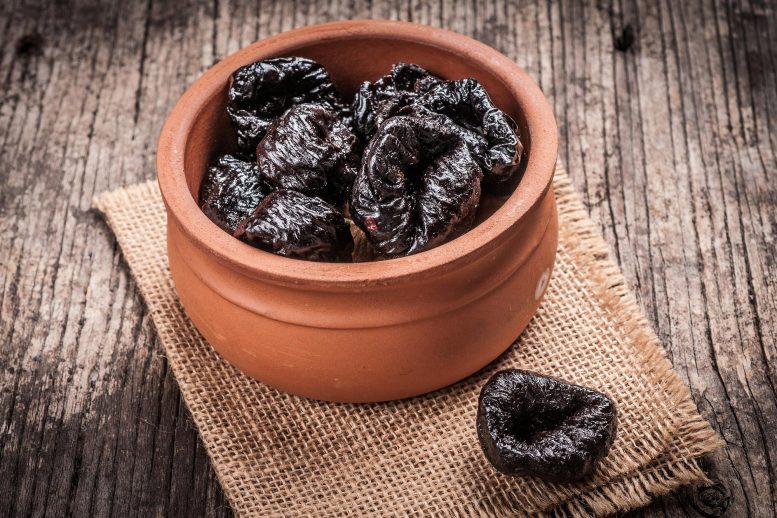
Prunes have prebiotic and bone-healing properties, according to a new study.
Science says yes.
According to a new study published in the journal Nutrients, prunes are a prebiotic food that can restore bone loss in mice. According to the study’s authors, the prebiotic effects of prunes’ carbohydrates and polyphenols help to restore bone health.
“Both the carbohydrate component and the polyphenols within the prunes altered the gut microbiota and were associated with positive effects on bone, namely restoring bone. By definition, prebiotics are substrates that alter the composition or activity of the microbiota and confer benefits to the health of the individual” explained Principal Investigator, Brenda Smith, Ph.D., Professor at the Indiana University School of Medicine. In this case, the benefit conferred was the restoration of bone loss.
Prunes have been shown in earlier research to promote beneficial gut microbiota alterations and preserve bone health. These benefits have been generally attributed to their polyphenolic compounds; however, the precise processes and contributions of other key nutrients, like carbohydrates, remain unknown.
Researchers separated polyphenol (PP) compounds and carbohydrates (CHO) from prunes and fed them to two distinct groups of estrogen-deficient female mice with significant bone loss over 5- and 10-week periods in this study. For comparison, three other groups of mice were fed diets containing either whole prunes, a prune crude extract comprising both PP and CHO prune components, or a diet containing neither prunes nor prune components, which served as the control group. In terms of macronutrients, all diets were similar.
In comparison to mice who did not take any prune or prune component, those that took isolated CHO, isolated PP, prune crude extract, or entire prunes had previously lost bone restored. These mice also demonstrated a large increase in short chain fatty acid (SCFA) production in their guts, as well as beneficial modifications in their gut microbiota. Researchers detected increases in the SCFAs n-butyrate and propionate in particular, which are considered to be especially efficient in preventing bone loss by suppressing biomarkers associated with bone breakdown.
These observations suggest that prunes and prune components may affect the gut in a manner that contributes to improved mineral absorption, immune system processes, and the gut barrier’s integrity – all of which can affect hormones, metabolites, and immune cells that play a role in bone health.
The researchers also reported that the CHO independently showed the ability to restore bone early in the study while the effect of the PP on bone became evident and more important later.
“Even though we think they’re both having prebiotic activity, those prebiotics are probably occurring by different mechanisms,” said Smith. She added that her findings make a strong case for consuming whole prunes “because you’re getting some of the benefit from the carbohydrate in the short term, and the long-term benefit from the polyphenols.”
Smith noted that the vitamins, minerals, and plant compounds in prunes may also contribute to the bone and gut benefits. This research gets us closer to understanding the unique attributes of prunes while underscoring the importance of eating the fruit in its entirety.
This study is one of several recent or current studies that are further exploring the benefits of prunes and their specific components on different health conditions. Additional studies that will be presented or published in the near term will investigate the relationship between prune consumption and inflammation in postmenopausal women, glucocorticoid-induced osteoporosis in mice, and colon cancer suppression in rats. These studies are expected to build upon the existing body of evidence that points to prunes as a bone- and gut- supportive food.
Reference: “Dried Plum’s Polyphenolic Compounds and Carbohydrates Contribute to Its Osteoprotective Effects and Exhibit Prebiotic Activity in Estrogen Deficient C57BL/6 Mice” by Brenda J. Smith, Bethany Hatter, Karley Washburn, Jennifer Graef-Downard, Babajide A. Ojo, Guadalupe Davila El-Rassi, Robert H. Cichewicz, Mark Payton and Edralin A. Lucas, 19 April 2022, Nutrients.
DOI: 10.3390%2Fnu14091685

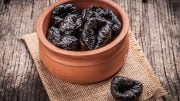
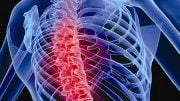



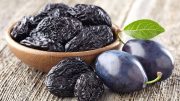
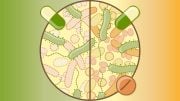

Be the first to comment on "Can Prunes Improve Bone Health?"